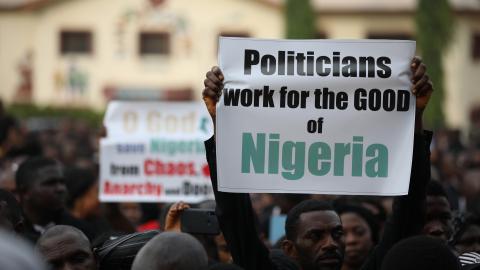Below is a cowritten letter that Nina Shea signed. The original can be found here.
Dear Members of Congress,
As religious freedom advocates and proponents, and leaders of grassroots organizations with millions of American members, we appeal to you to urgently respond to the Department of State’s failure to adequately address egregious, systematic, and ongoing religious persecution in Nigeria, as required by the International Religious Freedom Act (IRFA) of 1998.
We specifically urge Nigeria’s designation as a Country of Particular Concern (CPC) under the IRFA and the appointment of a special envoy for Nigeria and the Lake Chad Region. Additionally, we urge you to support and cosponsor the bi-partisan legislation authored by Rep. Chris Smith and Rep. Henry Cuellar House Resolution 82, which calls for the State Department to carry out these two steps.
A staggering 90 percent of all the Christians killed for their faith worldwide last year were killed in Nigeria, according to Open Doors, an increase from the 80 percent it reported in 2021. Over 5,000 Nigerian Christians are reported to have been killed for their faith in 2022.
Most of this slaughter is now carried out by militants within the Fulani Muslim herder population, who have been allowed to act largely with impunity. While some Muslims have also been killed by the same forces, the Observatory for Religious Freedom in Africa found that, from October 2019 to September 2022, Christians in Nigeria were 7.6 times more likely to be killed and 6 times more likely to be abducted than Muslims by terrorist and militia groups, when taking into account their population’s proportions in Nigeria’s states.
Catholic priests, evangelical pastors, and Methodist bishops have been special targets of kidnapping by Fulani and unidentified gunmen, typically shouting “Allahu Akbar.” The pontifical organization, Aid to the Church in Need, reports that, since early 2022 alone, 100 Nigerian Catholic priests have been kidnapped and not yet freed, 20 of whom were murdered, with many of these attacks occurring on church grounds. Nigerian media also reports the kidnapping of two imams from their mosques in 2022. Since 2009, some 17,000 churches have been burned and attacked, while many of them -- such as St. Francis Xavier Catholic Church in Ondo State that was attacked on Pentecost Sunday last year -- were filled with worshippers. We are not aware of a single case that has been prosecuted.
The U.S. Commission on International Religious Freedom reports that in “northcentral Nigeria, ethnonationalists fighting to promote Fulani interests target Christian civilians based on ethnoreligious identity.” In recommending CPC designation, it concludes that the Nigerian Government has “routinely failed to investigate these attacks and prosecute those responsible, demonstrating a problematic level of apathy on the part of state officials.”
In addition, terror groups such as Boko Haram and the Islamic State West Africa Province have attacked and killed thousands of Christians and Muslims who reject their dictates. Unknown numbers of Christian girls and women have been kidnapped into sexual slavery. Boko Haram kidnapped over 200 schoolgirls in 2014 in Chibok, Borno State, half of whom remain captive and are pressured to convert to Islam, while Leah Sharibu remains enslaved following a terrorist raid of her school in Dapchi, Yobe State, in 2018.
Lawlessness has resulted in millions of internally displaced Nigerians and hundreds of thousands of refugees. Just this year, in Nigeria’s north central Benue State, whose population is overwhelmingly Christian, nearly two million farming families were displaced by Fulani militants. Some of them were then hunted down in their places of refuge and brutally hacked to death. Catholic Bishop Wilfred Anagbe of Benue’s Makurdi diocese recently shared video documentation of the aftermath of one such attack with numerous Members of Congress.
Authorities also engage directly in religious persecution by enforcing Islamic blasphemy laws that have resulted in recent death sentences for Sufi musician Yahaya Sharif-Aminu and two Muslim clerics, and “religious insult” laws that led to a 24-year sentence for Nigeria’s Humanist Association head, Mubarak Bala. Moreover, these laws have been accompanied by a routine grant of impunity for extrajudicial attacks against their perceived violators. Last year, there was the unprosecuted mob killing of student Deborah Emmanuel Yakubu after she was accused of blasphemy and the unprosecuted serious death threats against the Sultan of Sokoto, Sokoto’s Catholic bishop, and Rhoda Jatau, a Christian woman, all three of whom were targeted for expressing disapproval of Yakubu’s murder.
IRFA requires frank assessments in the face of such grave religious freedom violations. The Secretary of State should acknowledge that Nigeria has “engaged in or tolerated” severe religious freedom violations, the statutory criteria warranting CPC designation. This is particularly important since the United States is a major partner of Nigeria, having given it over $1 billion in foreign aid in 2022, alone.
As Africa’s most populous country and its largest economy, Nigeria wields significant influence in Sub-Saharan Africa. By allowing religious persecution to proliferate within its borders, Nigeria is compounding already heightened regional insecurity. Both American interests and the International Religious Freedom Act require a response. We view the passage of the bi-partisan House Resolution 82 as an essential first step.

















